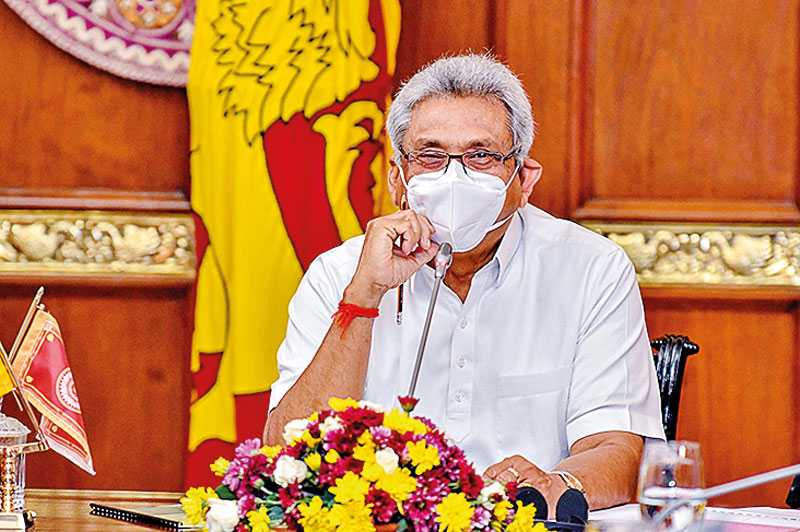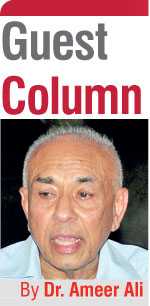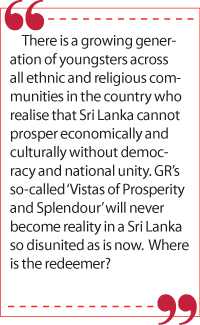Saturday Feb 14, 2026
Saturday Feb 14, 2026
Thursday, 24 December 2020 00:00 - - {{hitsCtrl.values.hits}}

With economic failure and mismanagement of the pandemic, corruption at all levels still remains a problem in spite of GR’s promise to eradicate it. On top of all this is creeping militarisation of public administration
 The GR-MR regime is failing on three key fronts: economy, public health and clean administration. Already, with the election of GR as President, democracy has been bid farewell and, with the 20th Amendment, the regime is not going to retreat from its resolve to establish a family-based militarised autocracy with Buddhist supremacy as its ideological edifice.
The GR-MR regime is failing on three key fronts: economy, public health and clean administration. Already, with the election of GR as President, democracy has been bid farewell and, with the 20th Amendment, the regime is not going to retreat from its resolve to establish a family-based militarised autocracy with Buddhist supremacy as its ideological edifice.
The Rajapaksa siblings with their mélange of power brokers, among whom are a hard core of politicised ethno-religious monks and businessmen, thought that by delivering economic prosperity and clean government, they would be excused by history for depriving the nation of its legacy of parliamentary democracy.
To their misfortune however, COVID-19 came as a shocker from outside to spoil the agenda, and it added public health as the third and more immediate issue to tackle, because the pandemic proved to be a calamity not only to people’s lives, but to the economy as well. Though successful in controlling the virus during its first wave, the regime relaxed that control in its haste to revive the economy, and lately, with 70% more virility, as detected in UK, the pandemic is adding to the economic woes of the regime.
Sickness of the economy
The sickness of the economy has already been diagnosed by several experts both locally as well as internationally and they all agree that unless some tough and systematic remedial measures are undertaken the condition of the patient would deteriorate.
Without sustained budgetary and balance of payment surpluses over successive years the nation is warned that it would not be in a position to fulfil its international debt obligations, even though the Central Bank and the Ministry of Finance are putting up a brave face to refute that possibility. Economic rationality is clashing with political expediency.
A good example of that clash is evident from the withdrawal of the $ 480 million MCC project by the US. Even though there were some negative elements associated with that project, which threatened the sovereignty of the country, there was a positive side, which Sri Lanka could have exploited to the maximum.
Already, several international rating agencies and global financial institutions have downgraded the country as an unreliable financial borrower. That downgrading is a warning for international investors thinking of investing in Sri Lanka. Therefore, to counter that warning the MCC project of such financial magnitude could have been flagged to show the rest of the world as a vote of confidence by the super power on the country’s economic potential.
Moreover, with Chanakyan diplomacy and negotiations, MCC negatives could have been minimised while its positives maximised. But the rulers had already rejected the project outright on political grounds, even before they came to power. MCC withdrawal would now seem an endorsement of international warnings and would deter other prospective foreign investors.
The regime is losing the economic war
It is now becoming clear that the regime is losing the economic war. The situation in the consumer market is advertising that loss. Wholesale and retail centres are running out of adequate supplies, shortages are multiplying, and prices are totally unpredictable. In sheer desperation, the Government is trying to impose price ceilings without appropriate mechanisms to control the black market.
Several mafias and their shenanigans with access to corridors of power are ruling the market, particularly in essential consumer items such as rice, vegetables and condiments. Import controls and their relaxation are undertaken whimsically without a planned strategy. Controls reduce public revenue and relaxations kill local production.
Corruption at all levels and militarisation
With economic failure and mismanagement of the pandemic, corruption at all levels still remains a problem in spite of GR’s promise to eradicate it. On top of all this is creeping militarisation of public administration. Rule by diktats is taking over rule by consultation and consensus. As a result, there is growing anger at the grassroot level, sometime erupting into sporadic street protests, which are selectively hidden from public view by a subtly-controlled media.
Yet, the defeat of annual budgets in several SLPP controlled Pradeshiya Sabhas is an open manifestation of that anger. This dwindling popularity may be the reason why one section in the regime wants to hold the next Provincial Council Elections sooner rather than later. However, PCs have become a red herring in the process of constitution making. That the supremacists are canvassing hard to do away with PCs altogether underscores their unwillingness to devolve power to minorities.
Ethnic issue trump card
‘When in doubt play a trump’ is a convention in the game of bridge. Likewise, as the regime realises the growing unpopularity it will not hesitate to play its trump card, and that card is the perennial ethnic issue, which is now emerging not in its usual Tamil frame but in new Muslim frame. Since 2009 and particularly after the Easter Sunday massacre, the Muslim card is earmarked as trump to be used whenever a need arises to deflect public anger at the regime.
The continued intransigence over Muslim burials that has angered an entire community is based entirely on political grounds and has nothing to do with science and epidemiology. It is to the credit of Muslims that their community leaders are keeping that anger under control without allowing anything untoward happening that may provoke widespread violence against them, which would be a total disaster.
Given this scenario the question arises, where is the opposition that could channel the growing dissatisfaction and anger into an organised political challenge to the regime, but with an alternative policy package to win support of the people? The existing Opposition seems to be ineffective and on an electorally suicide mission by picking issues at random to criticise the regime while lacking a comprehensive alternative to pull the nation out of the prevailing rut.
To start with, without a united country the economy cannot be revived and its productive capacity cannot be optimised. No amount of economic theorising could hide this vital truth. The stumbling block to forge that unity is the unwillingness of aspiring leaders to denounce publicly the Buddhist supremacist hegemonic agenda, and declare the country as belonging to all communities and their people who all have equal rights politically, economically and culturally.
By not doing this the aspirants demonstrate their own political opportunism and capriciousness, and their willingness to adopt at least part of that agenda when need arises. The only one who dared to denounce was the former Yahapalana Minister Mangala Samaraweera, and we all know how he was ostracised by the Buddhist clergy community.
There is a growing generation of youngsters across all ethnic and religious communities in the country who realise that Sri Lanka cannot prosper economically and culturally without democracy and national unity. GR’s so-called ‘Vistas of Prosperity and Splendour’ will never become reality in a Sri Lanka so disunited as is now. Where is the redeemer?
(The writer is attached to the School of Business and Governance, Murdoch University, Western Australia.)